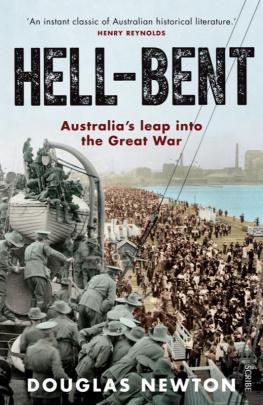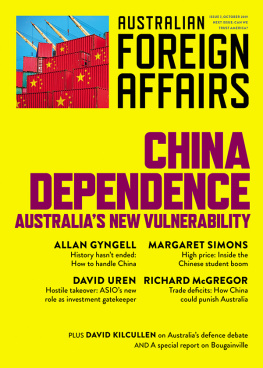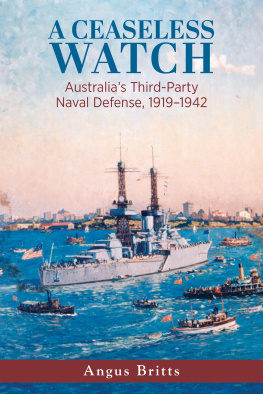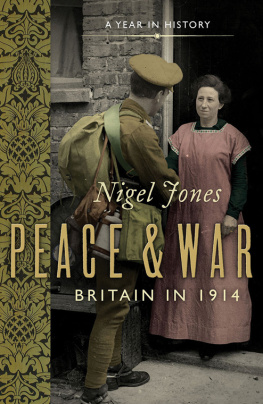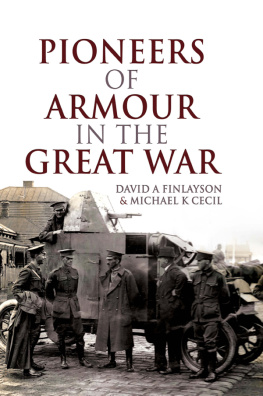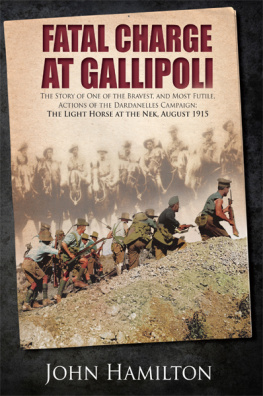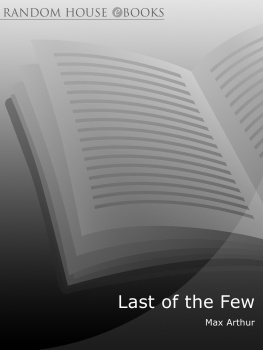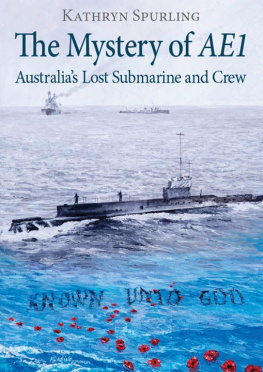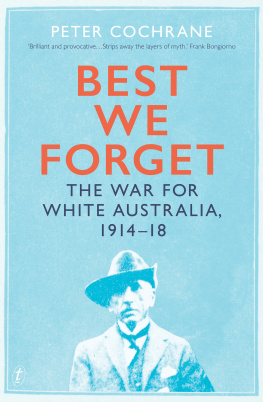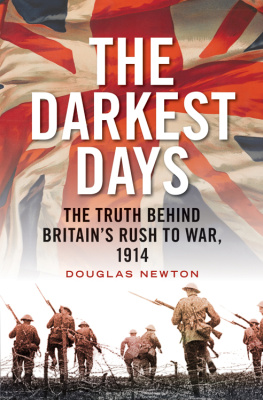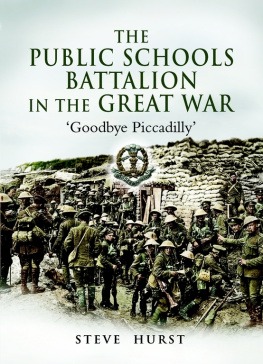
Scribe Publications
HELL-BENT
Douglas Newton was born in Sydney in 1952 and is a retired academic, having taught European history at the Victoria University of Wellington, New Zealand, in 198690, and at the University of Western Sydney for the following eighteen years. His special interests are peace and war in the period 18901919. He has published academic studies of the peace movement before 1914, the peacemaking of 19181919, and Germany in the period of Weimar and Nazism, and is currently preparing a history of the struggle for a negotiated peace during the Great War. He lives in Sydney.
Scribe Publications Pty Ltd
1820 Edward St, Brunswick, Victoria 3056, Australia
50A Kingsway Place, Sans Walk, London, EC1R 0LU, United Kingdom
First published by Scribe 2014
Copyright Douglas Newton 2014
All rights reserved. Without limiting the rights under copyright reserved above, no part of this publication may be reproduced, stored in or introduced into a retrieval system, or transmitted, in any form or by any means (electronic, mechanical, photocopying, recording or otherwise) without the prior written permission of the publishers of this book.
Chapters 1, 5, 12, 14, 16, 19, and 21 of this book contain material that has appeared in more extensive form in Douglas Newton, The Darkest Days: the truth behind Britains rush to war , 1914 (London: Verso, 2014). It is reproduced with the kind permission of Verso Books.
Extract from All Our Yesterdays by Henry Major Tomlinson reprinted by permission of Peters Fraser & Dunlop (www.petersfraserdunlop.com) on behalf of the Estate of Henry Major Tomlinson.
National Library of Australia
Cataloguing-in-Publication data
Newton, Douglas J., author.
Hell-Bent: Australias leap into the Great War / Douglas Newton.
9781925106060 (paperback)
9781925113365 (e-book)
1. World War, 1914-1918Participation, Australian. 2. World War, 1914-1918Participation, British. 3. War, Declaration ofGreat Britain. 4. Great BritainPolitics and government1901-1936. 5. AustraliaPolitics and government1901-1914.
940.32241
scribepublications.com.au
scribepublications.co.uk
For David Keir and Juliette Kim
Utterly incredible The long expected European war has come. A dozen or so diplomats, a score of ministers, and two or three monarchs have been offending one another, so to make things straight they have ordered out millions of peaceful citizens to go and get massacred. The Government have been telling us lies and we believed them. We were committed and we did not know it, so without being attacked or our own interests in any way threatened we joined in. It is an end of Liberalism, of social reform, of progress itself for the moment. And no one can see what the future has in store.
Arthur Ponsonby, Diary, 13 August 1914
Contents
Melbourne and London, Monday 3 August 1914
Australia and Britain, 19001911
Australia and Britain, 19111914
Australia, July 1914
London, Friday 24 July to Wednesday 29 July
Melbourne and Sydney, Tuesday 28 July to Saturday 1 August
Wellington, Ottawa, Melbourne, Friday 31 July to Sunday 2 August
Colac and Horsham, Friday 31 July
Sydney, Friday 31 July
Sydney, Friday 31 July to Sunday 2 August
Sydney, Friday 31 July to Saturday 1 August
London, Saturday 1 August
Melbourne, Saturday 1 August to Monday 3 August
London, Sunday 2 August
Melbourne, Monday 3 August
London, Monday 3 August
London, Friday 31 July to Tuesday 4 August
London, Monday 3 August and Tuesday 4 August
London, Tuesday 4 August
Melbourne, Tuesday 4 August and Wednesday 5 August
London and Melbourne, Wednesday 5 August and Thursday 6 August
19141915
Australias leap into the Great War
Introduction
AUSTRALIA WAS BOUND to fight in 1914 end of story. Australia was constitutionally, politically, and emotionally incapable of any other response than absolute loyalty to the British Empire in 1914 end of story. That is the proposition advanced in many histories of Australias Great War. And it is essentially correct, at least in terms of ultimate outcomes. If the British Empire plunged into war in 1914, Australia was indeed bound to fight. No doubt about it.
But should this be the end of the story? Is there really nothing more to investigate in the manner of Australias leap into the Great War?
What if Australia leapt before the British themselves? What if Australia publicly offered troops to any destination, entirely at Australias expense, under the control of the imperial authorities, before the British had decided upon war at all? What if Australia offered to transfer her entire newly christened Royal Australian Navy to the British Admiralty before the British asked for it?
Then, conceding that the decision for war was always going to be Londons, we might ask questions about the interleaving of events in Britain and Australia in the countdown to war. What if the choice for war in London was a very close-run thing, while Australia threw caution to the winds and gave the impression of being eager for action? What if Australias offer of troops and ships was made at a moment when the British cabinet of Liberal prime minister Herbert Asquith was locked in a dispute between neutralists and interventionists over the need for Britain to intervene at all in a continental war? What if Australias politicians, competing with each other in the middle of a federal election campaign, made their open-ended offers of assistance to Britain for war at a moment when that British cabinet was tottering on the brink of collapse over the issue of intervention? What if Australia in a spirit of competition with New Zealand and Canada made these offers at the very moment prime minister Asquith faced four resignations from his cabinet in real time, on Monday morning 3 August 1914?
Then the issue of the impact of Australias offers at the centre of the empire becomes important. What if Australias apparent champing at the bit had an effect in London? What if Australias politicians, in a spirit of political competition, gave the impression that the nation was desperate to contribute to an imperial war? What if the Australian politicians rhetorical boasts of their readiness to throw the last stripling and the last penny into Armageddon were flaunted in the British press? What if they were trumpeted by the British Tory politicians, in a frantic political campaign to steer the Liberal government into war for the sake of Russia and France?
We may search deeper into the detail. What if Australias eagerness to offer her new navy came at a time when the neutralist British cabinet ministers were furious that Winston Churchill, First Lord of the Admiralty, was ordering naval movements early in the crisis, without cabinet sanction movements that incited the hard-liners in Russia and France? What if the neutralist faction in Asquiths cabinet, which had long struggled against the idea of throwing a British expeditionary force (BEF) into war in Europe, were hobbled in their efforts by the dominions public offers of expeditionary forces, to go anywhere, for any objective, defensive or offensive?
As we shall see, all the things suggested in these questions did happen on the swift path to the cataclysm of world war in JulyAugust 1914. Therefore, a bland end of story a fatalistic acceptance that no better outcome was ever possible undersells the drama, the tragedy, and the infinite possibilities for something better in this story. There is a story here a new story. New perspectives are possible if we interleave the story of Australias leap into the Great War and the story of the choice for war in Britain. That is the aim of this book.
Next page
